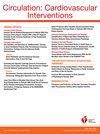在不符合筛查周边图上推荐的过大标准的患者中使用和谐瓣膜进行经导管肺动脉瓣置换术
IF 6.1
1区 医学
Q1 CARDIAC & CARDIOVASCULAR SYSTEMS
Circulation: Cardiovascular Interventions
Pub Date : 2024-04-12
DOI:10.1161/circinterventions.123.013889
引用次数: 0
摘要
背景:通过筛查报告和周长图(PP)确定 Harmony 瓣膜植入的解剖选择,周长图描述了沿右心室流出道(RVOT)的周长半径,并预测了装置的过大尺寸。周长图可以估计是否适合植入,但其作为筛选方法的灵敏度尚不清楚。方法:我们回顾了使用 Harmony TPV25 设备进行经导管肺动脉瓣置换术的患者的 RVOT 解剖特征和测量结果。结果:该研究共纳入了 22 名患者,其中没有植入失败或与瓣膜相关的不良事件。解剖学特征各不相同,但所有患者都符合以 RVOT 尺寸差异为特征的 3 种解剖学类型中的一种。1型患者(9人)的RVOT较长,有一个扼流点,主肺动脉较宽。2型患者(6人)的RVOT较短,呈金字塔形,没有扼流点,收缩期主肺动脉广泛延长/扩张。结论:经导管使用 Harmony 瓣膜进行肺动脉瓣置换对某些 PP 拟合分析预测尺寸过大的患者是可行的。该系列中的所有病例均符合 3 种解剖模式中的一种,但筛选报告中并未确定这些模式。植入者必须逐个审查病例,以评估植入的可行性。本文章由计算机程序翻译,如有差异,请以英文原文为准。
Transcatheter Pulmonary Valve Replacement With the Harmony Valve in Patients Who Do Not Meet Recommended Oversizing Criteria on the Screening Perimeter Plot
BACKGROUND:Anatomic selection for Harmony valve implant is determined with the aid of a screening report and perimeter plot (PP) that depicts the perimeter-derived radius along the right ventricular outflow tract (RVOT) and projects device oversizing. The PP provides an estimation of suitability for implant, but its sensitivity as a screening method is unknown. This study was performed to describe anatomic features and outcomes in patients who underwent Harmony TPV25 implant despite a PP that predicted inadequate oversizing.METHODS:We reviewed RVOT anatomic features and measurements in patients who underwent transcatheter pulmonary valve replacement with the Harmony TPV25 device despite a PP that predicted inadequate oversizing.RESULTS:This study included 22 patients. There were no unsuccessful implants or adverse valve-related events. Anatomic features varied, but all patients fit into 1 of 3 anatomic types characterized by differences in RVOT dimensions. Type 1 patients (n=9) had a long RVOT with a choke point and a wide main pulmonary artery. Type 2 patients (n=6) had a short RVOT that was pyramidal in shape, with no choke point, and extensive main pulmonary artery lengthening/expansion during systole. Type 3 patients (n=7) had a short, bulbous main pulmonary artery with a choke point and an open pulmonary artery bifurcation.CONCLUSIONS:Transcatheter pulmonary valve replacement with the Harmony valve is feasible in some patients whose PP fit analysis predicts inadequate oversizing. All cases in this series fit into 1 of 3 anatomic patterns, which are not identified in the screening report. Implanters must review cases individually to assess the feasibility of the implant.
求助全文
通过发布文献求助,成功后即可免费获取论文全文。
去求助
来源期刊

Circulation: Cardiovascular Interventions
CARDIAC & CARDIOVASCULAR SYSTEMS-
CiteScore
10.30
自引率
1.80%
发文量
221
审稿时长
6-12 weeks
期刊介绍:
Circulation: Cardiovascular Interventions, an American Heart Association journal, focuses on interventional techniques pertaining to coronary artery disease, structural heart disease, and vascular disease, with priority placed on original research and on randomized trials and large registry studies. In addition, pharmacological, diagnostic, and pathophysiological aspects of interventional cardiology are given special attention in this online-only journal.
 求助内容:
求助内容: 应助结果提醒方式:
应助结果提醒方式:


